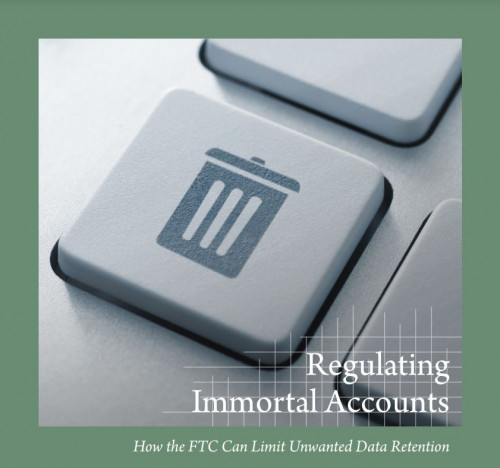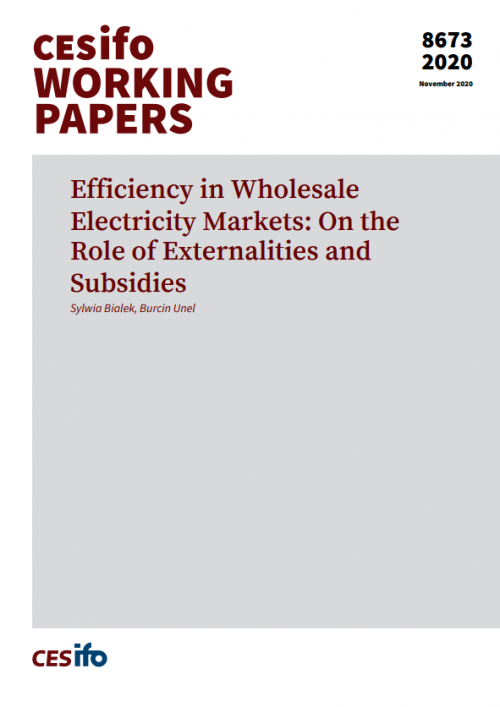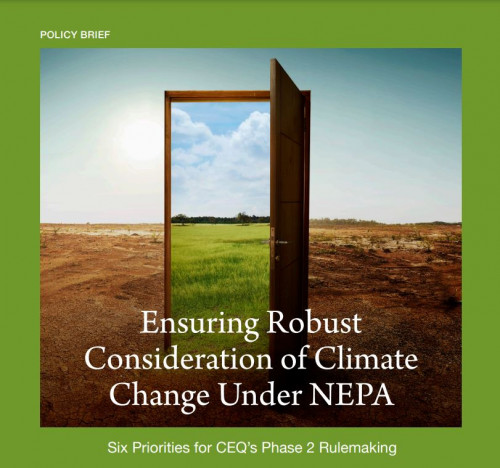-
Regulating Immortal Accounts
How the FTC Can Limit Unwanted Data Retention
The report argues that an FTC rule requiring reasonable cancellation practices for all market actors and providing clear and specific guidelines would address the harms of immortal accounts. Such regulation would fall under the FTC’s authority and advance the Commission’s mission to protect consumers and competition by preventing deceptive, unfair, and anticompetitive business practices.
-
Comments to EPA on Proposed Heavy-Duty Vehicle Emission Standards
In March 2022, EPA proposed standards to regulate emissions of nitrogen oxides and particulate matter from heavy-duty vehicles beginning with Model Year 2027. Policy Integrity submitted comments recommending that EPA strengthen these crucial standards in order to fulfill EPA's statutory duty to set standards "reflecting the greatest degree of emission reduction achievable." We also made a number of recommendations designed to ensure that EPA is properly comparing regulatory alternatives and accounting for the benefits of strong regulation.
-
Amicus Brief in Fifth Circuit Supporting Reversal of Injunction on the Social Cost of Greenhouse Gases
In this amicus brief, we explain how the Interagency Working Group based its climate-damage valuations on voluminous and expert science, and that its approach followed regulatory guidance and precedent. In particular, the brief supports the Working Group's selection of discount rates and geographic scope, explaining how those choices followed expert consensus and were consistent with agency treatment of other regulatory impacts.
-
Efficiency in Wholesale Electricity Markets: On the Role of Externalities and Subsidies
Published in Energy Economics
In our article published in Energy Economics, we use economic modeling to analytically show the relationship between generation subsidies and energy and capacity markets. We show that the feared capacity price suppression can happen only under limited circumstances and that in the short-run, the subsidies will tend to increase capacity prices. We also demonstrate that while subsidies cannot produce the first-best outcomes, there exists a range of welfare-enhancing subsidy rates and designs that improve welfare, such that regulators should think of subsidies as one of the tools available for increasing electricity market efficiency.
-
Comment Letters on FERC’s Proposed Policy Statements for Natural Gas Infrastructure
In February, the Federal Energy Regulatory Commission released two policy statements that acknowledged the Commission’s role in shaping the nation’s transition to a low-carbon future and called for the consideration of climate impacts in pipeline certificate proceedings. Today, the Institute for Policy Integrity filed two comment letters to these proposed policy statements.
In one of our comment letters—filed jointly with over two dozen legal scholars from institutes across the country—we rebut arguments from opponents of the policies that the Commission lacks authority to consider climate effects in its oversight of natural gas infrastructure under the Natural Gas Act.
In our other comment letter, we explain that the policy statements serve as an important step toward ensuring that upstream and downstream emissions are properly considered in line with the Commission’s statutory obligations, but provide several suggestions for improvements.
-
Comments to FERC on Regional Energy Access Expansion Project DEIS
Today we submitted comments to FERC on the draft environmental impact statement for Transcontinental Gas Pipe Line Co.'s Regional Energy Access Expansion Project. These comments offer recommendations for improving the Commission's assessment of climate and environmental justice impacts of the project, and its consideration of alternatives.
-
Comments to FERC on Iroquois Gas Certificate Order
Today we submitted comments to FERC regarding its decision to grant a certificate of public convenience and necessity to Iroquois Gas for its Enhancement by Compression Project. These comments begin by underscoring the Commission's obligation to independently review and scrutinize lifecycle greenhouse gas emission reports (or other evidence regarding net emissions associated with a project) submitted by applicants. The comments also highlight flaws in Iroquois' analysis which undermine the conclusion that the project will result in a decrease of emissions. The Commission overlooked these flaws in relying on the analysis to conclude the project would result in a net reduction, such that it need not further assess the project's climate impacts.
-
Ensuring Robust Consideration of Climate Change Under NEPA
Six Priorities for CEQ’s Phase 2 Rulemaking
In April 2022, the Council on Environmental Quality (CEQ) finalized a limited, “Phase 1” rulemaking to restore several longstanding features of the regulations that guide agency assessments under the National Environmental Policy Act (NEPA) which CEQ had removed in 2020. In that rule, CEQ reaffirmed its intentions to further revise the regulations to better ensure that agencies make decisions that “advance environmental, climate change mitigation and resilience, and environmental justice objectives.” This policy brief outlines six simple regulatory revisions that CEQ should prioritize for its “Phase 2” rulemaking to improve consideration of climate change during environmental review.
-
Comments to CEQ on Carbon Capture, Utilization, and Sequestration Guidance
The White House Council on Environmental Quality (CEQ) recently released interim guidance on Carbon Capture, Utilization, and Sequestration (CCUS) to assist federal agencies with regulation, permitting, and associated activities. We filed comments urging CEQ to update the guidance document with additional targeted recommendations for agencies on monitoring, reporting and verification (MRV) programs; project prioritization; and other topics.
-
Comments to EPA on Proposal to Reaffirm “Appropriate-and-Necessary” Finding for Regulating Hazardous Air Pollution from Power Plants
In February 2022, the Environmental Protection Agency (EPA) proposed: (1) to revoke its May 2020 finding that it is not appropriate and necessary to regulate coal- and oil-fired electric utility steam generating units (EGUs) under Clean Air Act (CAA) Section 112 (2020 Action), and (2) to reaffirm the Agency's April 2016 finding that it remains appropriate and necessary to regulate hazardous air pollutant (HAP) emissions from EGUs after considering cost (2016 Supplemental Finding). Our comments on the Proposal explain why EPA should finalize both these actions as consistent with the Clean Air Act, case law, executive directives, principles of sound economic analysis, and past agency practice.










